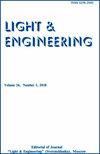博物馆展览照明新形式的探索路径与解决方案
IF 0.3
4区 工程技术
Q4 ENGINEERING, ELECTRICAL & ELECTRONIC
引用次数: 0
摘要
展览环境设计现状的改变,电气照明已成为博物馆展览创新转型与发展的驱动力。光已经成为一种真正的造型和空间建模工具。具体的博物馆照明体验的形成仍然是一个跨学科的问题,统一了定量指标衡量的技术方面和定性标准,包括美学,心理和生理方面,形成每个展览的氛围。博物馆展览照明设计采用概念设计方法,包括传统的设计工具和创新的数字技术。概念设计方法以跨学科、综合和联觉的形式表现出来。斯特罗加诺夫学院的教育和艺术项目在解决博物馆环境灯光设计的不同问题上积累了丰富的经验。一个照明系统成为:-一个传统艺术设计的对象;-灯光设计展览;-博物馆的光影互动环境;-公园博物馆的合成环境;-新艺术风格的基础,如光艺术和科学艺术,媒体装置和3D映射;-数字博物馆新形象的创造者等。因此,光成为连接博物馆整个人文系统的纽带:它的科学、历史、教育、美学和工程组成部分。跨学科形式的光功能(从传统的光设计到数字媒体和互动项目)是无限的,并将为博物馆环境提供更多新的信息呈现形式和感知,在架上和应用版本之间不断平衡。本文章由计算机程序翻译,如有差异,请以英文原文为准。
Search Paths and Solutions for new Forms of Museum Exhibition Lighting
The changed design status of exhibition environment electrical lighting has become the driver of innovative transformations and development of museum exhibitions. Light has become a real form-making and space-modelling tool. Formation of specific museum experience of lighting remains an interdisciplinary problem unifying technical aspects measured by quantitative indicators and qualitative criteria including aesthetical, psychological, and physiological aspects, forming the atmosphere of each exhibit. Museum exhibition lighting is designed using the conceptual design method, which includes conventional design tools and innovative digital technology. The conceptual design method expresses itself in interdisciplinary, synthetic and synaesthesia forms. Educational and art projects of the Stroganov Academy have accumulated a significant experience in solving different problems of museum environment light design on associative conceptual basis. A lighting system becomes: – An object of traditional art design; – A light design exhibit; – An interactive light-and-colour environment of a museum; – A synthetic environment of a park museum; – A basis of new art styles like light art and science art, media installations and 3D mapping; – Creator of a new image of a digital museum, etc. As a result, light becomes a link connecting the entire humanitarian system of a museum: its scientific, historical, educational, aesthetical and engineering components. Interdisciplinary forms of light functioning (from conventional light design to digital media and interactive projects) are limitless and will grow providing the museum environment with more new forms of information presentation and perception constantly balancing between easel and applied versions.
求助全文
通过发布文献求助,成功后即可免费获取论文全文。
去求助
来源期刊

Light & Engineering
ENGINEERING, ELECTRICAL & ELECTRONIC-OPTICS
CiteScore
1.00
自引率
50.00%
发文量
0
审稿时长
1 months
期刊介绍:
Our magazine
develops comprehensive communication within the lighting community, providing opportunities for discussion and free expression of opinions of specialists of different profiles;
contributes to the convergence of science and engineering practice, the search for opportunities for the application of research results in lighting and technological applications of light;
keeps the scientific community up to date with the latest advances in the theory of the light field, providing readers with operational professional information;
initiates international cooperation, promotes and distributes the results of Russian authors in the international professional community;
provides equal opportunities for authors from different regions of Russia and other countries.
The journal publishes articles in the following areas:
visual and non-visual effects of radiation on humans;
light field theory;
photometry and colorimetry;
sources of light;
ballasts;
light devices, their design and production technology;
lighting and irradiation installation;
light signaling;
methods of mathematical modeling of light devices and installations;
problems of energy saving in lighting, installation and operation of lighting installations;
modern production technologies of lighting products for lighting control systems;
innovative design solutions;
innovations in lighting and lighting design;
the study of the effect on plants and animals, problems of using light in medicine;
problems of disinfection of premises, water and smell elimination with the help of technology of UV radiation using;
problems of light in the ocean and space.
 求助内容:
求助内容: 应助结果提醒方式:
应助结果提醒方式:


